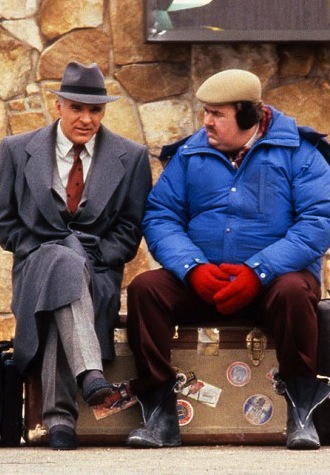November 26, 1987
PLANES,TRAINS AND AUTOMOBILES. Music by Ira Newborn. Written, produced and directed by John Hughes. Running time: 92 minutes. Mature entertainment with the B.C. Classifier's warning: some very coarse and suggestive language.
NEAL PAGE (STEVE MARTIN) has been under a lot of pressure lately. As he inches forward in a St. Louis airport car-rental counter line, we can see the stress building. He is supposed to be at home celebrating Thanksgiving with his wife and family in Chicago. A successful advertising executive, he was booked on a 6 p.m. flight out of New York just yesterday.
Things went wrong. First, there was that sales meeting that went on and on and on. Then, there was an unsuccessful scramble for a cab.
It's as if his life had suddenly become a demonstration of Murphy's Law.
Though his ticket is first class, his seat assignment is coach. Though his destination is Chicago, the plane is diverted to Wichita.
Adding to his irritation, and turning it into torture, is Del Griffith (John Candy). Somehow, Page's fate becomes wedded to that of an overweight shower-curtain-ring salesman, a big-hearted, loud-mouthed vulgarian and an all-American bore.
Now, dishevelled and wild-eyed, Page advances on the car rental agent. He's suffered frustration, insult and indignity. His patience is at an end and his sophisticated veneer is in tatters. He glowers as the clerk and uses the "F" word.
John Hughes is showing signs of strain. The writer-director who made his mark with such innovative teen films as The Breakfast Club (1985), Pretty in Pink (1986) and Ferris Bueller's Day Off (1986), he occasionally stretches himself too thinly.
It happened with Weird Science (1985), a teen fantasy that relied on special effects to flesh out its one-joke plot. It happens again with Planes, Trains and Automobiles, a road comedy that's cobbled together from gags discarded from his first produced screenplay, National Lampoon's Vacation (1983).
Here, he takes the slightest of ideas — mismatched travelling companions — and relies on his stars to make it work. In effect, he asks Martin and Candy to turn themselves into a latter-day Laurel and Hardy. The "fine mess'' that they must contend with is modern travel. For foils, Hughes provides them with a selection of middle-American grotesques whose attitudes range from malicious through indifferent to ineptly sympathetic.
In crafting situations, Hughes is careful to not go over the top. Everything that happens to his unfortunate travellers is within the realm of the possible, the sort of incident that we all dread, occasionally experience and are supposed to laugh about later.
If we're to laugh about them here, it's essential that we feel strongly for his characters. Unfortunately, neither Page nor Griffith is particularly likeable.
As written, these guys seem to deserve one another and all the misery that life offers. Despite their talents, neither Candy nor Martin is able to make much headway against a script that is essentially a series of mean-tempered skits.
The above is a restored version of a Province review by Michael Walsh originally published in 1987. For additional information on this archived material, please visit my FAQ.
Afterword: Bear in mind that John Hughes made his movie 14 years before 9/11, the day that changed North American air travel forever. It's hard to think of the man best known for his teen movies as a prophet, but the trials suffered by his odd couple really have become commonplace for far too many travellers.
It is also memorable as the film that brought Hughes together with John Candy (previously seen as the travelling-companion-from-hell in Nicholas Meyers' superb 1985 feature Volunteers). The Toronto-born actor had appeared as a supporting player in 1983's Vacation, directed by Harold Ramis from a Hughes screenplay. During Planes, Trains and Automobiles, they became close friends and Hughes cast the actor in the next two films he directed, She's Having a Baby (1988) and Uncle Buck (1990), in which Candy played the title character. As a screenwriter, Hughes created starring roles for his friend in The Great Outdoors (1990) and Only the Lonely (1991), and supporting parts in Home Alone (1990) and Career Opportunities (1991). According to published reports, Hughes was greatly shaken by Candy's sudden death in 1994.
